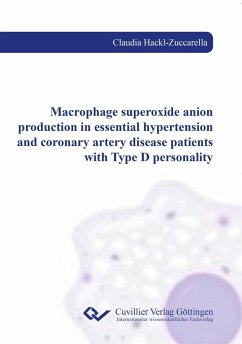The aim of the present thesis was to examine superoxide anions released by human inflammatory macrophages in individuals with essential hypertension and coronary artery disease patients with Type D personality, in order to shed more light on the mechanisms that link hypertension with an increased risk of atherosclerosis and Type D personality with poor cardiac prognosis in coronary artery disease patients, respectively. Therefore, in a first step, a simple and accurate in vitro method for the measurement of superoxide anions by human inflammatory macrophages was implemented and validated. Superoxide anion production by human inflammatory macrophages, measured by means of the reliable and valid in vitro WST-1 assay, was higher both in individuals with essential hypertension and in coronary artery disease patients with Type D personality compared to their control groups. Furthermore, mean arterial blood pressure as well as the two Type D subscales ¿negative affectivity¿ and ¿social inhibition¿, and their interaction, were associated with higher macrophage superoxide anion production. These findings suggest that superoxide anion production by inflammatory macrophages may play a mechanistic role in the mediation of both atherosclerotic risk in hypertension and poor cardiac prognosis in coronary artery disease patients with Type D personality.








